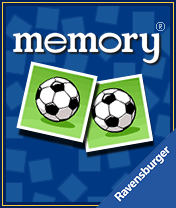
There's a man in my office with an Everton mug. Everybody else uses disposable plastic cups. When we're done, we toss the cups into the recycling bin and strut back to our desks without a care in the world. Everton man, meanwhile, has to take his mug to the toilets at the end of every shift and wash it with liquid soap and paper towels. The chump.
It really is amazing how much you can increase the appeal of a product by putting a picture on it. Everton man's mug is exactly like any other mug, yet his attitude towards it is clearly one of fierce pride.
Still, exploiting predilections clearly works, which is probably why HandyGames has used the method in Memory. As with the publisher's other memory-enhancing title, Classic Memory, the simple object is to recall the location of matching pairs of cards.
However, whereas in Classic Memory the matching images depict a variety of objects and scenes, in Memory all of the pictures have something to do with football.
This means that if you're into footie, the game is a constant thrill. Every time you turn over a card, bam, there it is, a picture of something to do with football – whether it be a ball tearing through the back of a net, a raised yellow card, a corner flag, or one of many other scintillating football-related images.
For example, you might turn over a picture of a nervous-looking pundit and then, whilst searching for its twin, discover a picture of a referee blowing a whistle; then, whilst looking for the referee's twin you might find a pair of shorts, and so on.
There are 18 such footie-themed pictures to look at. Each time you find a pair, those cards are removed from the display and the game ends once you've eliminated all cards. There are eight cards to dispatch in Easy mode, 24 in Medium, and 36 in Difficult.
In Memory's favour, the images are crisp and nicely drawn, while the scenes they depict are sufficiently varied in colour, shape, and subject matter to make them memorable. So even in Difficult setting, the game is more accessible than it might have been thanks to the thought that has gone into the pictures.
To discourage gawping and button-mashing, HandyGames has built a semblance of structure into the dynamic by including a timer and keeping a record of the number of cards you've turned between the first and the last. There's therefore not only an incentive to find all of the pairs, but to find them quickly and with a minimum amount of fumbling.
The premise may be remarkably basic, but Memory tries to combat this by being well dressed and conscientiously endowed with features. There are three audio options, the three aforementioned difficulty levels, and even a two-player pass-and-play mode to enjoy with friends who like to look at pictures of things to do with football, while the sound is beefy and presentation is polished.
At the end of the day, however, these positives don't add up to nearly enough. If Memory had a story mode, or a set of missions against the clock, or anything suggesting HandyGames had made a genuine effort, the credible sound and graphics might have represented fitting embellishments. As it is, they're the football-shaped icing on a fairly flavourless cake.
Memory

